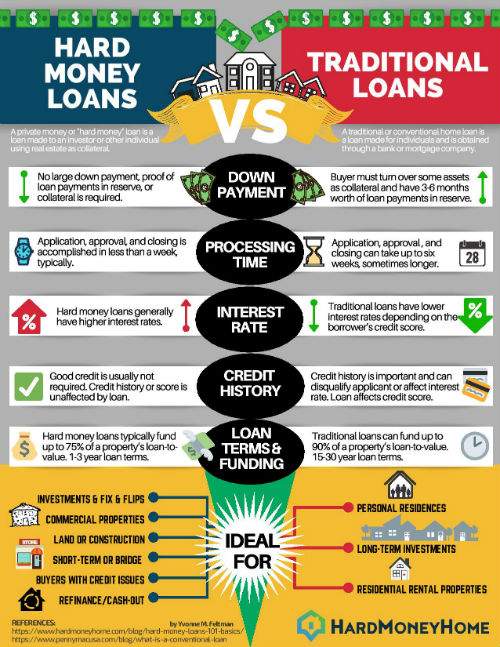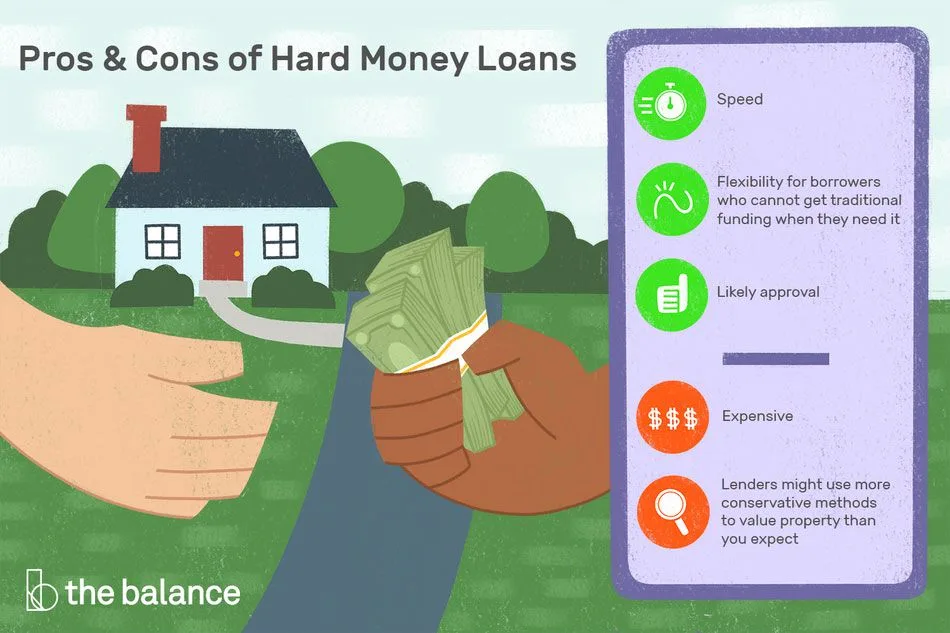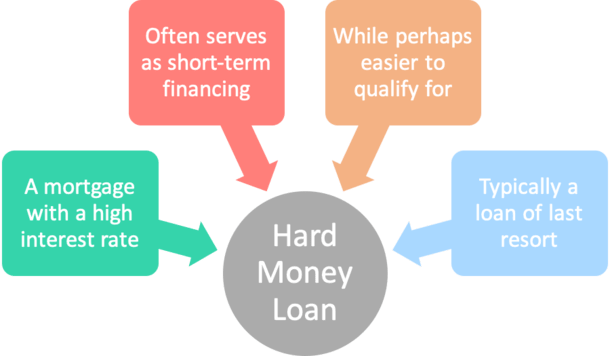If you are currently burdened with a hard money loan and seeking a more favorable solution, you may be wondering if refinancing with a traditional mortgage is a viable option. This article aims to explore the feasibility of refinancing a hard money loan with a traditional mortgage and shed light on the potential benefits and considerations involved in this financial decision. By examining the key factors at play, you will gain valuable insights into the possibilities of transitioning from a hard money loan to a traditional mortgage.

What is a hard money loan?
A hard money loan is a type of financing that is typically secured by real estate. Unlike traditional mortgages, hard money loans are often provided by private investors or companies, rather than banks or credit unions. These loans are typically short-term with higher interest rates and are used by borrowers who may not qualify for traditional financing due to credit or income limitations. Hard money loans are commonly used in real estate transactions such as fix and flip projects or investment properties.
Understanding the basics of a traditional mortgage
A traditional mortgage, on the other hand, is a loan that is obtained from a bank, credit union, or mortgage company. These loans are typically long-term and have lower interest rates compared to hard money loans. Traditional mortgages are widely used by homebuyers to finance the purchase of a primary residence or investment properties. They are usually based on factors such as creditworthiness, income, and collateral value. Traditional mortgages often come with fixed or adjustable interest rates and have repayment terms of 15 to 30 years.
Reasons for refinancing a hard money loan
Lower interest rates
One of the primary reasons to refinance a hard money loan with a traditional mortgage is to take advantage of lower interest rates. Hard money loans generally come with higher interest rates to compensate for the increased risk to the lender. By refinancing with a traditional mortgage, you may be able to secure a lower interest rate, which can result in significant savings over the life of the loan.
Longer repayment terms
Another advantage of refinancing a hard money loan is the opportunity to extend the repayment terms. Hard money loans are typically short-term, often with terms of one to three years. If you need more time to repay the loan or are looking for a more manageable monthly payment, refinancing with a traditional mortgage can provide you with longer repayment terms, such as 15 or 30 years.
Improved creditworthiness
Refinancing a hard money loan with a traditional mortgage can also help improve your creditworthiness. Paying off the high-interest hard money loan and replacing it with a traditional mortgage can positively impact your credit score over time. As you make timely payments on your new mortgage, it can demonstrate financial responsibility to lenders and potentially open up additional borrowing opportunities in the future.
Access to additional funds
Depending on the circumstances, refinancing a hard money loan with a traditional mortgage may allow you to access additional funds. If the value of your property has increased since you obtained the hard money loan, you may be able to refinance for a higher loan amount and use the excess funds to finance other projects or investments. This provides a valuable source of liquidity and can help you seize new opportunities.
Challenges in refinancing a hard money loan
While refinancing a hard money loan with a traditional mortgage can offer several benefits, there are some challenges involved in the process. One of the main challenges is meeting the strict qualification criteria set by traditional lenders. Unlike hard money loans, which are often based on the value of the collateral, traditional mortgages consider factors such as credit score, debt-to-income ratio, stable employment, and income history. If you don’t meet the eligibility requirements, it may be difficult to refinance the loan.
Additionally, refinancing a hard money loan requires a property appraisal to determine its current value. If the property value has depreciated or remains unchanged, it may hinder your ability to refinance the loan. Since traditional lenders rely heavily on collateral value, it is essential to ensure your property is appraised favorably to increase the chances of approval.

Qualifying for a traditional mortgage
To refinance a hard money loan with a traditional mortgage, you must qualify for the new loan based on traditional lenders’ criteria. Some of the key factors to consider when qualifying for a traditional mortgage include:
Credit score requirements
Traditional lenders typically have minimum credit score requirements for borrowers. A higher credit score indicates financial responsibility and reduces the lender’s risk. To qualify for a traditional mortgage, it is essential to have a good credit score, usually above 620, although specific requirements may vary between lenders.
Debt-to-income ratio
Lenders also consider the borrower’s debt-to-income ratio, which measures the percentage of monthly income that goes towards debt obligations. A lower debt-to-income ratio is favorable, as it indicates a lower risk of default on the mortgage. Generally, a debt-to-income ratio of 43% or lower is preferred by traditional lenders.
Stable employment and income
Traditional lenders assess the stability of a borrower’s employment and income. They prefer applicants who have a consistent employment history and a reliable source of income. Demonstrating stability in employment can improve your chances of qualifying for a traditional mortgage.
Property appraisal
As mentioned earlier, the value of the property will be assessed through an appraisal during the refinancing process. The lender will want to ensure that the property’s value is sufficient to provide adequate collateral for the new loan. It is crucial to have a professional appraisal conducted to determine the property’s current market value accurately.
Steps to refinance a hard money loan with a traditional mortgage
If you meet the qualification criteria and decide to refinance a hard money loan with a traditional mortgage, the following steps outline the process:
Evaluate the costs and benefits
Before proceeding with the refinancing process, it is essential to evaluate the costs and benefits. Consider the potential savings in interest, repayment terms, and any additional expenses such as closing costs and appraisals fees. Assess whether the benefits outweigh the costs and if refinancing aligns with your long-term financial goals.
Improve creditworthiness
If your credit score or debt-to-income ratio is not optimal, take steps to improve your creditworthiness. Paying bills on time, reducing outstanding debts, and avoiding new credit applications can help increase your credit score over time. Enhancing your financial profile will significantly improve your chances of qualifying for a traditional mortgage.
Research available mortgage options
Research and compare different mortgage options available in the market. Consider factors such as interest rates, repayment terms, and loan programs offered by various lenders. Narrow down your options to a few lenders that best suit your needs and preferences.
Submit a mortgage application
Once you have selected a lender, prepare and submit a mortgage application. Be prepared to provide detailed information about your financial history, employment, income, and the property you intend to refinance. Gather all the necessary documents, such as tax returns, bank statements, and proof of income.
Get an appraisal on the property
The lender will order an appraisal on the property to determine its current market value. This is a critical step in the refinancing process, as the property’s value will directly impact the loan amount and terms offered by the lender. Cooperate with the appraiser and provide any relevant information required to facilitate a fair and accurate appraisal.
Undergo the underwriting process
Once the appraisal is complete, the lender will review your application and the property appraisal report. This is known as the underwriting process, where the lender evaluates your eligibility and assesses the property’s value. During this stage, the lender may request additional documentation or clarification on certain aspects of your application.
Close the new mortgage loan
If your application is approved, you will proceed with the closing process. This involves signing the loan documents and paying any required closing costs, which can include fees such as origination fees, appraisal fees, and title fees. Once the loan is closed, the hard money loan will be paid off, and you will begin making payments on the new traditional mortgage.

Considerations before refinancing a hard money loan
Before refinancing a hard money loan with a traditional mortgage, it is crucial to consider the following factors:
Prepayment penalties
Some hard money loans may have prepayment penalties, which are fees charged if the loan is paid off before a certain time frame. Ensure you understand the terms of your hard money loan and whether there are any prepayment penalties that could impact the overall cost of refinancing.
Mortgage closing costs
Similar to the closing costs associated with purchasing a property, refinancing a hard money loan with a traditional mortgage may involve various closing costs. These costs can include appraisal fees, attorney fees, title fees, and origination fees. Consider these costs when evaluating the financial benefits of refinancing.
Impact on credit score
Refinancing a hard money loan with a traditional mortgage can have an impact on your credit score. Applying for a new mortgage and closing an existing loan may result in a temporary decrease in your credit score. However, if you make timely payments on the new mortgage loan, it can ultimately have a positive impact on your creditworthiness in the long run.
Comparison of interest rates and terms
When considering refinancing options, compare the interest rates and repayment terms offered by different lenders. Ensure that the terms of the new mortgage loan are more favorable than the existing hard money loan. It is essential to carefully analyze the potential savings and determine whether the refinancing option aligns with your financial goals.
Advantages of refinancing a hard money loan with a traditional mortgage
Refinancing a hard money loan with a traditional mortgage offers several advantages:
Lower interest rates
One of the significant advantages of refinancing is the potential for lower interest rates. Traditional mortgages typically offer lower interest rates compared to hard money loans. This can result in substantial long-term savings by reducing your monthly payments and overall interest paid over the life of the loan.
Flexible repayment terms
Traditional mortgages provide borrowers with flexible repayment terms. With longer loan terms available, you can choose a plan that suits your financial situation and goals. This flexibility allows for more manageable monthly payments, giving borrowers greater stability and financial security.
Opportunity for long-term financing
By refinancing a hard money loan with a traditional mortgage, you gain access to long-term financing. This can be particularly beneficial if you are involved in a fix and flip project and require more time to complete the renovations and sell the property. The longer loan term allows for a more extended investment horizon and provides the opportunity to maximize returns.

Disadvantages of refinancing a hard money loan with a traditional mortgage
While there are advantages to refinancing, it is important to consider the potential disadvantages as well:
Strict qualification criteria
Traditional mortgages have stricter qualification criteria compared to hard money loans. Lenders will thoroughly assess factors such as credit score, employment history, income stability, and debt-to-income ratios. If you do not meet these criteria, it may be challenging to qualify for a traditional mortgage.
Longer application process
Refinancing a hard money loan with a traditional mortgage involves a longer application process than obtaining a hard money loan. You will need to gather and provide extensive documentation, go through the underwriting process, and satisfy all the lender’s requirements. This can result in a more extended timeline to complete the refinancing process.
Potential for higher closing costs
Refinancing a hard money loan with a traditional mortgage can come with higher closing costs. These costs can include appraisal fees, attorney fees, origination fees, and other expenses associated with the new loan. It is crucial to factor in these costs when considering the financial benefits of refinancing.
Alternative options to refinance a hard money loan
If refinancing with a traditional mortgage is not feasible or does not align with your financial goals, there are alternative options to consider:
Finding a new hard money lender
If you are unable to qualify for a traditional mortgage or do not want to go through the refinancing process, you can explore finding a new hard money lender. Research and compare different hard money lenders to find one that offers more favorable terms, lower interest rates, and longer repayment terms. This can provide you with the opportunity to extend the loan and possibly reduce the interest burden.
Seeking private financing
Private financing is another alternative option to refinance a hard money loan. Private lenders, such as individual investors or companies, may be willing to provide financing based on their own criteria and terms. While private financing may come with higher interest rates and shorter repayment terms than traditional mortgages, it can still provide a viable solution for borrowers who do not qualify for conventional financing.
Exploring other loan products
Finally, exploring other loan products may be an option to refinance a hard money loan. For example, FHA loans or VA loans may provide alternative financing options for certain borrowers, such as first-time homebuyers or veterans. These loan programs often have less stringent qualification criteria and can offer competitive interest rates and repayment terms.
In conclusion, refinancing a hard money loan with a traditional mortgage can provide borrowers with several advantages, such as lower interest rates, longer repayment terms, improved creditworthiness, and access to additional funds. However, it is important to consider the challenges and factors involved in the refinancing process, including qualification criteria, closing costs, and potential impact on credit scores. By carefully evaluating the costs and benefits and exploring alternative options, borrowers can make an informed decision on whether or not to refinance their hard money loan.




